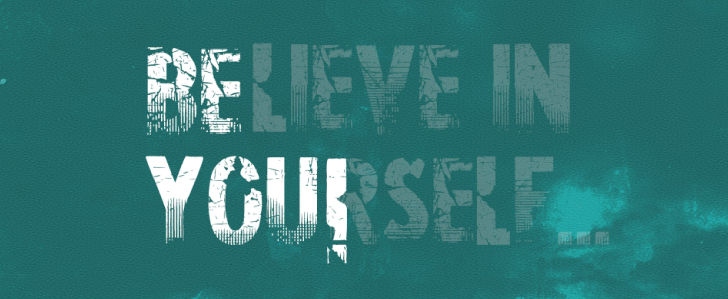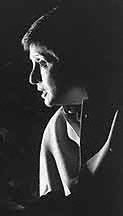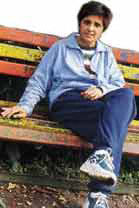- Home
- Archive -Dec 1998
- I Am Here To Do. . .

I Am Here To Do My Best For The Day
- In :
- Motivation
By Life Positive
Kiran Bedi has many firsts to her credit—first woman IPS officer in India, first woman head of Tihar, the largest prison in Asia-Pacific, first person to introduce vipassana meditation inside Tihar and turn the conventional attitude towards crime on its head.
Winner of the 1994 Ramon Magsaysay award, Kiran Bedi’s eventful life has already been chronicled in her biography I Dare. It’s Always Possible, the first book written by her, shifts focus to the now-famous Tihar experiment. Interspersed with little-known personal experiences from the supercop’s life, this book is already a hot-seller. At present head of the police training school in Delhi, the tough-as-nails, controversial, and crusading Kiran Bedi talks to Saurabh Bhattacharya on herself, her view of crime and corruption, positive thinking, and her spiritual journey in uniform.
 |
Your book is titled It’s Always Possible. How do you keep yourself so positively charged?
I think it’s a training of attitude. The attitude is solidly entrenched. It has come through upbringing, constant awareness and conscious training. I belong to a Peshawaria family from Amritsar (in the northern Indian state of Punjab) that was considered one of the premier families of the town in those days. It believed in simple living, a lot of hard work, and tremendous discipline. My parents were conscious of the fact that excellence is important. They never talked of average results.
What has been your attitude to challenges?
I have really lived from match to match. Not to beat others, but to challenge myself. I set my own goals. And when I’m reaching a goal, I put it further away to see whether I can stretch myself a bit more. I was confident that whenever I put in that extra effort that hurt, I could realize that my hard work is paying. For no work is hard work till it hurts.
How did you survive the innumerable controversies dotting your career—from arresting a lawyer to your daughter’s admission to a medical college?
I don’t back down from decisions that I think are legally, morally and ethically right. The moral strength of the decision gives me courage.
Why did you choose a career in police?
I found the police force the strongest arm of the government to correct, to produce good results. As a young girl, I could see policemen not performing. But I knew that if they would perform, it would have tremendous results. For me policing is not punitive. It always stood for social welfare. But tough welfare. Where I could command welfare, I could demand welfare, and I could produce welfare. And, if necessary, I could produce welfare punitively. Policing is not sending people to prison. Policing is to show them the route to correction, maybe through the prison.
How did your peers in the IPS take the inclusion of a woman in their ranks?
I had no time to observe how people were feeling. I came from a sports background where often I was the only girl traveling with a batch of 20 boys.
You are known for your crusade to clean up a corrupt system. What makes you take up such an onerous responsibility?
I’m not here to clean up the world. I’m here to do my best for the day and extend my goals. But if I start thinking I’ve only done my little bit at the end of the day and the rest of the world remains unclean, I think I’m being unrealistic. I must do the job in hand which I’m authorized to do. And if I could do that well, that’ll be making a difference.
Can a person live without being corrupt?
If your needs are minimum and you are confident of meeting your basic needs, what are you afraid of? All you need is clean living—clean and simple food, clean clothes and a clean shelter. And if you are happy and content in that, then all corrupt practices become petty.
Most people bribe to get things done, like getting a telephone line repaired or buying a train ticket. Can such corruption be done away with?
Unfortunately, I don’t come into that category because I have not suffered that. But within my own situation, I had other temptations, which have been kept away.
 |
Does the training of a policeman brutalize him?
Training is about understanding, hard work and mental toughness. But within all this, you can keep a sensitive heart. But police officials do become insensitive… It’s too late in the day for them. They have offered themselves to become habituated with their circumstances. And sometimes circumstances have compelled them to do so. Brutality, like a drug, is also addictive. Can there be rehabilitation in that as well? It is possible. But it’s difficult. If I were to change people habituated to insensitive ways of policing, I would ask them to take a minimum of three years’ leave. And I’ll send them back to college. That’s the only way I can sensitize them.
Have you ever used third degree means to break a criminal?
Third degree is an act done with an element of sadism. I’ve never used third degree as a sadist. But I’ve been tough. Policemen have to give two images—they mean business and they will be tough till you cooperate. It need not be physical torture. But it can lead to much mental agony. And causing mental agony to a criminal is not third degree. That’s the price he’s paying for having committed a crime.
What creates crime—human failing, lack of faith in self, socio-economic factors or simply evil?
Crime is essentially human failing taking different forms. Therefore, I don’t look at a person as a sinner. I look at the sin per se. And I know there are probable reasons that can be corrected if related environmental factors and mindsets are treated. That’s how vipassana became a cornerstone. A correct mindset is essential for the person to introspect, to realize that he didn’t do the right thing.
As a mentally tough person, do you feel pity or do you commiserate with weakness?
I feel both. I feel anger when I know that the person is not as helpless as he claims to be. But when I know that he is a victim of circumstances, I commiserate with his plight.
Does man break easily or does he have it in him to fight odds?
Depends on how he has brought himself up. He can either be fragile or tough… But, innately… There is nothing like an inexperienced, environmentally withdrawn and non-attitudinal person. Each person has a set of attitudes that he has imbibed from his environment, experience and education. We are all the time learning and unlearning. And that’s how our reflexes are molded.
Before you introduced vipassana in Tihar, were you yourself into this meditation?
I wasn’t involved in vipassana as a technique. But I was always an observer of myself. I am basically two persons within. I read myself, talk to myself, study and analyze myself. I reprimand myself and I reward myself.
Is a detached point of view essential for a person?
Absolutely. It’s very important for a person to respect one’s own self. The more I respect myself, the more motivated I become. In fact, my biggest controller and Pathfinder is myself. And the biggest cause of drifting is also myself. I make my own choices—right or wrong.
On your first day at Tihar, you asked the inmates whether they prayed. Why?
Prayer is something that remains internally with me. If I have done good, I thank the Almighty and my circumstances. If I face a challenge and don’t have the answer, I pray. When I asked the prisoners whether they pray, I was basically asking them whether they were seeking forgiveness and help.
How do you rate your spiritual growth over the years?
The more pain, the more agony, the more dirt I see, the more my sensitivity grows. And this sensitivity is nothing but spirituality. I’ve also become more carefree. My needs are, over a period, getting minimized. I think that’s a growing up process.
Do you have a guru?
I am not any particular person’s pupil. Books are my teacher, there are teachers I respect in the Ramakrishna Mission, Guru (S.N.) Goenka is a great teacher.
Your belief in God—does it have a particular form?
My temple has all religions in it. It is the power of spirituality that I worship, not the form. I don’t have any religion as such.
To read more such articles on personal growth, inspirations and positivity, subscribe to our digital magazine at subscribe here
Life Positive follows a stringent review publishing mechanism. Every review received undergoes -
- 1. A mobile number and email ID verification check
- 2. Analysis by our seeker happiness team to double check for authenticity
- 3. Cross-checking, if required, by speaking to the seeker posting the review
Only after we're satisfied about the authenticity of a review is it allowed to go live on our website
Our award winning customer care team is available from 9 a.m to 9 p.m everyday
The Life Positive seal of trust implies:-
-
Standards guarantee:
All our healers and therapists undergo training and/or certification from authorized bodies before becoming professionals. They have a minimum professional experience of one year
-
Genuineness guarantee:
All our healers and therapists are genuinely passionate about doing service. They do their very best to help seekers (patients) live better lives.
-
Payment security:
All payments made to our healers are secure up to the point wherein if any session is paid for, it will be honoured dutifully and delivered promptly
-
Anonymity guarantee:
Every seekers (patients) details will always remain 100% confidential and will never be disclosed

In the early hours of the day during one of the (vipassana) courses, a sudden storm… resulted in the top and sides of the shamiana collapsing… All the rugs and the cushions were drenched. The stupendous efforts that went into ‘setting the stage’ were washed out…Goenkaji and his wife surveyed the scene, which looked as if a rampaging mob had ransacked the place. Both of them, however, maintained their equanimity and they advised to continue the program saying that everything would be all right… The public address system transmitted the guru’s instructions to the barracks, together with the soothing strains of music (that) succeeded in restoring a modicum of order and normalcy. The inmates, under the guidance of their teachers, began to concentrate on their meditation.
After breakfast, the weather began to clear, and a massive salvage operation was launched. A large phalanx of inmates, including those not attending the vipassana course, began the daunting task of restoring the devastated site. They carried more than 1,000 cushions outside the tent into the sun and put them to dry; sewed together numerous sections of torn material; reinstalled electric wires as well as the lights and the fans; mopped up areas with standing waters… By 7 p.m., the shamiana was ready again. Goenkaji’s discourse was the first item on the agenda, and it was delivered as scheduled.
As each of the ten days of the course passed by, the transformation process was all-pervading. Within these high walls, there was a sense of liberation. There was discipline without fear; there was devotion without coercion…
After the final session of meditation on April 15, 1994, the congregation comprising around 1,100 persons including the inmates, the jail staff and some guests witnessed the momentous inauguration of the new center in Prison No. 4, which Goenkaji named Dhamma Tihar. On this occasion, the erudite Guruji chanted this hymn:
All the beings of this ashram
May their misery be eradicated.
May pure Dharma arise in the minds of all
Making them pure from deep within
Making them serene from deep within.
Excerpted with permission from It’s Always Possible